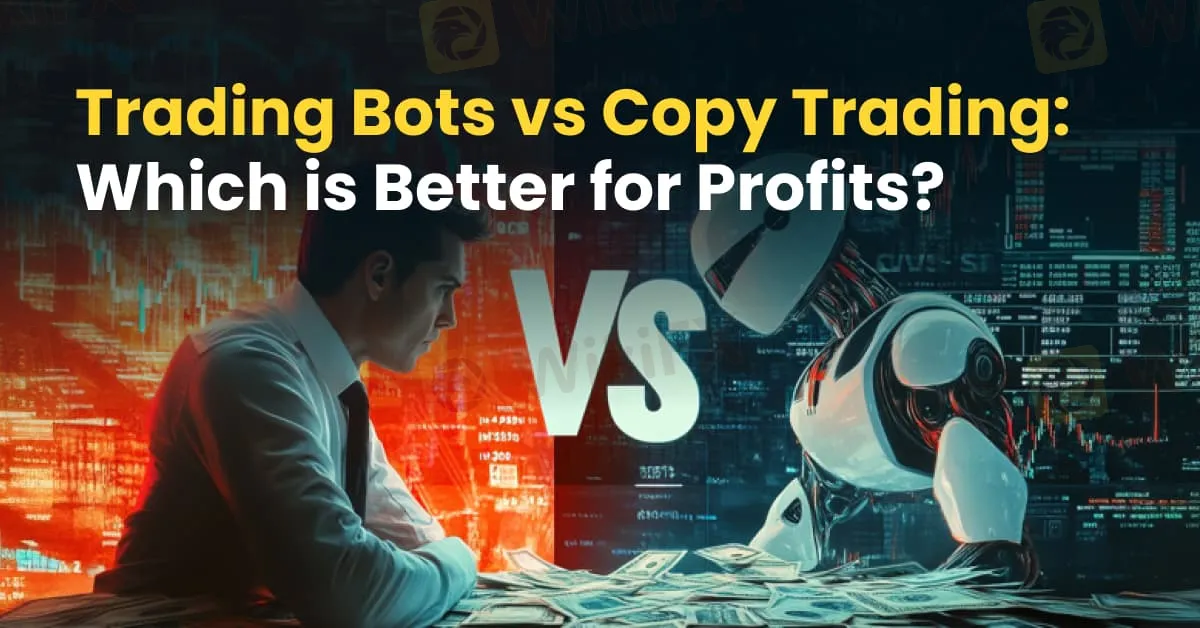简体中文
繁體中文
English
Pусский
日本語
ภาษาไทย
Tiếng Việt
Bahasa Indonesia
Español
हिन्दी
Filippiiniläinen
Français
Deutsch
Português
Türkçe
한국어
العربية
Trading Bots vs Copy Trading: Which is Better for Profits?
Abstract:The world of online trading has evolved rapidly, with automation becoming a dominant force. Among the most talked-about innovations are trading bots which are algorithmic programs designed to execute trades based on pre-set parameters. But how do these bots compare to copy trading, a system where investors replicate the trades of experienced traders? More importantly, can reliance on trading bots truly lead to financial freedom, or does it introduce more risks than rewards?

The world of online trading has evolved rapidly, with automation becoming a dominant force. Among the most talked-about innovations are trading bots which are algorithmic programs designed to execute trades based on pre-set parameters. But how do these bots compare to copy trading, a system where investors replicate the trades of experienced traders? More importantly, can reliance on trading bots truly lead to financial freedom, or does it introduce more risks than rewards?

Trading bots are designed to analyze market trends, execute trades, and manage risk, all without human intervention. These algorithms function 24/7, processing vast amounts of data at speeds no human trader can match. Some bots follow simple strategies, such as arbitrage or trend-following, while others use complex machine-learning models to predict market movements.
The appeal is clear: trading bots eliminate emotional decision-making, ensure disciplined execution, and provide access to opportunities that a human trader might miss. Yet, despite their advantages, they are not infallible. Market conditions change, and even the most advanced algorithms can suffer significant losses during periods of extreme volatility.

Copy trading, on the other hand, allows investors to mirror the trades of successful traders. Rather than relying on algorithms, users trust the expertise of seasoned professionals or influencers within the trading community. This strategy is often favoured by beginners who lack the time or knowledge to trade independently.
While copy trading does not require programming skills, it is not without risk. The strategy relies heavily on the performance of the chosen trader, meaning that if they make a poor decision, so does the investor following them. Unlike trading bots, which react to technical signals, human traders may rely on intuition or experience—factors that do not always guarantee success.

Many proponents of trading bots argue that automation is a gateway to financial freedom. The idea of generating passive income through algorithmic trading is undeniably appealing. However, true financial independence requires consistency and sustainability, both of which are difficult to guarantee with automated trading alone.
For one, markets are unpredictable. A bot that performs well in one market condition may fail in another. Additionally, many commercial trading bots promise high returns but lack transparency, leading to concerns about their reliability. Even professional-grade bots require regular adjustments and oversight to remain effective.
On the other hand, if used correctly, trading bots can act as a valuable supplementary tool. They can help traders execute strategies efficiently, remove emotional bias, and take advantage of opportunities that human traders might overlook. However, expecting them to single-handedly deliver financial freedom could be unrealistic.
Ultimately, both trading bots and copy trading present opportunities and risks. While automation can enhance trading efficiency, it is not a guaranteed route to wealth. Likewise, copy trading allows investors to leverage human expertise, but it still involves inherent risks.
So, is the future of trading fully automated, human-led, or a mix of both? The answer remains open for debate.

Disclaimer:
The views in this article only represent the author's personal views, and do not constitute investment advice on this platform. This platform does not guarantee the accuracy, completeness and timeliness of the information in the article, and will not be liable for any loss caused by the use of or reliance on the information in the article.
Read more

Never Heard of Dynasty Trade? Here's Why You Should Be Worried
Have you heard this name before? No , it’s time you do because staying unaware could cost you. This platform is currently active in the forex trading and has been linked to several suspicious activities. Even if you’ve never dealt with it directly, there’s a chance it could reach out to you through ads, calls, messages, or social media. That’s why it’s important to know the red flags in advance.

Want to Deposit in the EVM Prime Platform? Stop Before You Lose It ALL
Contemplating forex investments in the EVM Prime platform? Think again! We empathize with those who have been bearing losses after losses with EVM Prime. We don't want you to be its next victim. Read this story that has investor complaints about EVM Prime.

WEEKLY SCAM BROKERS LIST IS OUT! Check it now
If you missed this week's fraud brokers list and are finding it difficult to track them one by one — don’t worry! We’ve brought together all the scam brokers you need to avoid, all in one place. Check this list now to stay alert and protect yourself from fraudulent brokers.

Catch the Latest Update on BotBro & Lavish Chaudhary
BotBro, an AI-based trading platform, became popular in India in 2024—but for negative reasons. Its founder, Lavish Chaudhary, who gained a huge following by promoting it heavily on social media. Since then, he has become well-known, but for many controversies. Let’s know the latest update about Botbro & Lavish Chaudhary.
WikiFX Broker
Latest News
Is Your Forex Strategy Failing? Here’s When to Change
FSMA Warns That Some Firms Operate as Pyramid Schemes
Apex Trader Funding is an Unregulated Firm | You Must Know the Risks
Sigma-One Capital Scam? Investors Say They Can’t Withdraw Funds
Federal Reserve likely to hold interest rates steady despite pressure from Trump. Here's what that means for your money
WEEKLY SCAM BROKERS LIST IS OUT! Check it now
Intel drops 9% as chipmaker's foundry business axes projects, struggles to find customers
Palantir joins list of 20 most valuable U.S. companies, with stock more than doubling in 2025
Textiles to whisky: U.K.–India 'historic' deal is set to boost bilateral trade by over $34 billion a year
Thailand-Cambodia border clashes: Cambodia's economy has more to lose, analysts say
Currency Calculator


